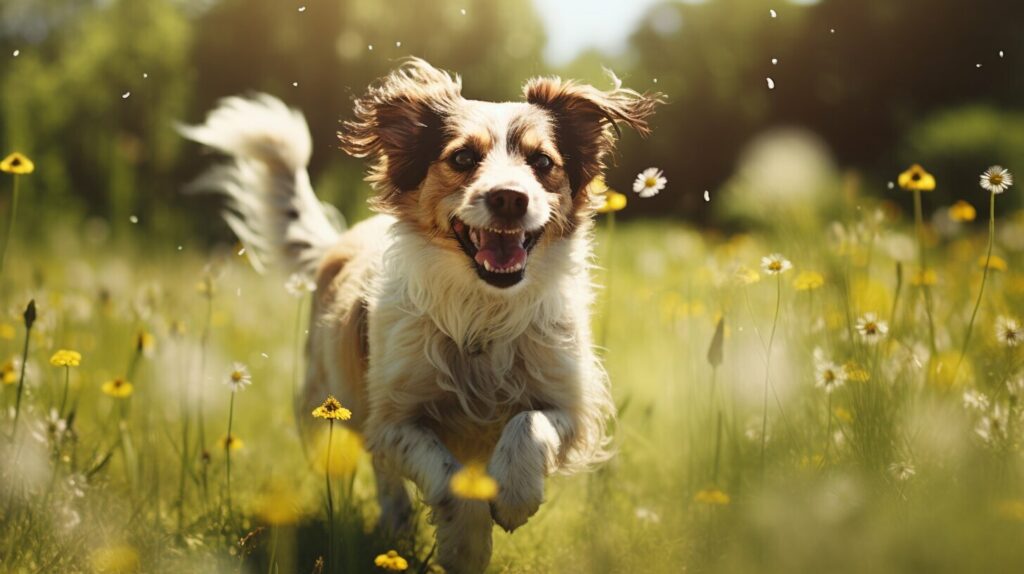If you’re a dog owner, it’s important to be aware of coccidia and its potential impact on your pet’s health. Coccidia is a parasitic infection that can cause diarrhea, vomiting, and weight loss in dogs. This highly contagious disease is caused by a microscopic organism, and it can be challenging to detect and treat.
To ensure your dog stays healthy and happy, it’s critical to take proactive measures to prevent coccidia and to seek medical treatment as soon as you suspect your dog may have contracted the disease.
Key Takeaways:
- Coccidia is a parasitic infection that can affect dogs of all ages.
- This disease is highly contagious and can cause a range of symptoms, including diarrhea, vomiting, and weight loss.
- Prevention is key to avoiding coccidia in dogs, and there are several strategies you can employ to reduce the risk of infection.
- If you suspect your dog has contracted coccidia, seek veterinary care immediately to ensure prompt and proper treatment.
What is Coccidia?
Coccidia is a type of single-celled parasite that can infect dogs and cause a disease known as coccidiosis. This disease is most commonly found in young dogs, puppies, and immunocompromised dogs, and it is highly contagious.
The life cycle of coccidia starts when a dog ingests a spore of the parasite, usually from contaminated water, soil, or fecal matter. These spores then enter the dog’s digestive system and develop into adult coccidia, which reproduce and release oocysts into the environment through the dog’s feces.
These oocysts can then infect other dogs that come into contact with them, leading to a cycle of infection.
Symptoms of coccidiosis can range from mild diarrhea to severe intestinal distress, dehydration, and even death if left untreated. It is important to recognize the symptoms and seek veterinary care promptly.
What are the Symptoms of Coccidia in Dogs?
Coccidia in dogs can cause a variety of symptoms, including:
- Diarrhea, which may be mild to severe and contain blood or mucus
- Vomiting
- Lack of appetite
- Weight loss
- Dehydration
If you notice any of these symptoms in your dog, it is important to seek veterinary care immediately. Your veterinarian can perform a diagnostic test to identify coccidia and recommend an appropriate course of treatment.
Symptoms of Coccidia in Dogs
Coccidia is a parasitic infection that can cause significant harm to your dog if left untreated. Here are the most common coccidia symptoms in dogs that you should be aware of:
- Diarrhea: One of the most telltale signs of coccidia in dogs is diarrhea. This may be accompanied by blood or mucus in the stool, which can be very concerning if severe.
- Lethargy: Dogs that are infected with coccidia may seem listless, unwilling to move or play, and generally less energetic than usual.
- Vomiting: While vomiting is less frequent than diarrhea, it’s still a possible symptom of coccidia in dogs. You may notice your dog retching or heaving without actually bringing anything up.
- Loss of appetite: Dogs with coccidiosis may be less interested in food or refuse to eat altogether.
- Weight loss: A sudden or significant drop in your dog’s weight is a red flag for coccidia. If you’re noticing that your dog is losing weight even though they’re eating normally, it’s time to see the vet.
It’s important to remember that these symptoms can vary in severity and may not appear all at once. Some dogs may not show any signs of coccidia at all, which is why regular veterinary checkups are so important. If you notice any of these symptoms in your dog, it’s crucial to seek veterinary care promptly. Your vet can conduct tests to diagnose coccidia and start treatment before the infection becomes more severe.
Diagnosing Coccidia in Dogs
If you suspect that your dog may have coccidia, it is essential to consult a veterinarian for proper diagnosis and treatment. There are several diagnostic methods used to identify coccidia in dogs, including:
| Diagnostic Method | Description |
|---|---|
| Fecal Flotation Test | A microscopic examination of your dog’s stool sample to detect coccidia oocysts. |
| PCR Test | A more advanced molecular technique that can detect small amounts of coccidia DNA in your dog’s stool. |
| Direct Fecal Smear | A less reliable method where a sample of your dog’s feces is examined under a microscope to look for coccidia organisms. |
It is crucial to note that not all dogs with coccidia will show symptoms, and a fecal flotation test may be negative even if your dog is infected. If your dog exhibits symptoms of coccidiosis, your veterinarian may recommend that treatment begins immediately, even before diagnostic test results are available.
The importance of proper testing for coccidia cannot be overstated. Misdiagnosis or delayed diagnosis of coccidiosis can lead to severe complications, including dehydration, malnutrition, and even death.
Treatment for Coccidia in Dogs
If your dog has been diagnosed with coccidia, it is essential to begin treatment promptly to avoid complications. There are various options available for treating coccidia, and your veterinarian can recommend the best one for your furry friend.
Coccidia medication for dogs: Antimicrobial drugs such as sulfadimethoxine and trimethoprim-sulfadiazine are commonly used to treat coccidia in dogs. Treatment typically lasts for about ten days, during which your dog may need to be hospitalized for observation.
While medication is crucial for eliminating the parasites, supportive care is also necessary to ensure your dog makes a full recovery. This includes a balanced diet, frequent hydration, and keeping your dog in a clean and comfortable environment.
It is essential to follow your veterinarian’s instructions and complete the full course of treatment, even if your dog’s symptoms improve. Failure to do so may result in the recurrence of coccidia, leading to additional health problems.
Preventing Coccidia in Dogs
If you want to keep your furry friend healthy and happy, it’s important to take steps to prevent coccidia in dogs. Preventative measures can help reduce the risk of infection and keep your pup feeling their best. Here are some tips to prevent coccidia in dogs:
- Cleanliness is key: Keeping your dog’s living area clean is essential in preventing coccidia. Regularly clean and disinfect bedding, toys, and food and water dishes. Also, pick up and dispose of feces immediately.
- Practice good hygiene: Wash your hands thoroughly with soap and water after handling your dog or cleaning up after them. This is especially important if you have multiple dogs in your household.
- Be aware of your dog’s environment: Avoid letting your dog come into contact with feces from other animals, including wildlife. This is especially important if you take your dog to dog parks or other public places where there may be other dogs.
- Watch what your dog eats: Coccidia can be found in contaminated food and water, so be cautious about what your dog eats and drinks. Avoid letting your dog drink from communal water sources, and always provide fresh, clean water.
- Stay up-to-date on vaccinations: Talk to your veterinarian about vaccination options for your dog. Vaccines are available for certain types of coccidia and can help reduce the risk of infection.
By following these preventative measures, you can help reduce the risk of coccidia in your dog and keep them healthy and happy for years to come.
Coccidia in Puppies: Special Considerations
If you have a young puppy, it’s important to be aware of the special considerations when dealing with coccidiosis. Puppies are especially susceptible to coccidia, as their immune systems are still developing. Here’s what you need to know:
Coccidia in puppies can be life-threatening if left untreated. Early detection and prompt treatment are essential for a successful recovery.
Common symptoms of coccidia in puppies include diarrhea, vomiting, loss of appetite, and lethargy. If your puppy displays any of these symptoms, it’s important to seek veterinary care as soon as possible.
The stress of weaning can also increase the risk of coccidiosis in puppies. Taking steps to minimize stress and keeping your puppy’s living area clean and hygienic can go a long way in preventing infection.
Diagnosing coccidia in puppies usually involves a fecal examination. If your puppy tests positive for coccidia, your veterinarian will recommend a course of treatment based on the severity of the infection.
It’s important to follow your veterinarian’s instructions closely when treating coccidia in puppies. Medications may need to be administered for several weeks, and supportive care may also be necessary.
Preventing coccidia in puppies involves maintaining a clean and hygienic living environment, minimizing stress during weaning, and avoiding exposure to contaminated feces. Additionally, vaccines are available for some types of coccidia, which can help protect your puppy from infection.
Tips for Managing Coccidia in Multi-Dog Environments
If you have multiple dogs in your household or manage a kennel, it’s important to take extra precautions to prevent the spread of coccidia. Here are some tips to keep in mind:
- Maintain Good Hygiene: Regular cleaning and disinfecting of the environment is essential to prevent the spread of coccidia. Use a veterinary disinfectant or a 10% bleach solution to clean eating and drinking bowls, kennels, and any other shared items.
- Schedule Regular Veterinary Check-ups: Regular check-ups can help detect coccidia early and prevent it from spreading. Make sure your dogs receive preventive care, including regular deworming and fecal exams.
- Separate Infected Dogs: If one of your dogs is diagnosed with coccidia, it’s important to separate them from the rest of the pack to prevent spread. Keep them in a separate kennel and use separate bowls and toys.
- Discourage Fecal-Oral Contact: Dogs can become infected with coccidia by ingesting the parasite from contaminated feces. Discourage fecal-oral contact by quickly disposing of dog waste and keeping dogs away from other dogs’ feces.
- Monitor Your Dogs: Keep an eye on your dogs for any signs of coccidia, such as diarrhea or vomiting. If you notice any symptoms, seek veterinary care right away to prevent the spread of coccidia.
By following these tips, you can help prevent the spread of coccidia in multi-dog environments and keep your furry companions healthy.
Conclusion
Coccidia in dogs is a common and potentially serious condition that every pet owner should be aware of. By understanding the causes, symptoms, and treatment options for this disease, you can better protect your dog’s health and well-being.
To prevent coccidia in dogs, it’s important to maintain good hygiene practices and keep your dog’s living environment clean. Make sure to follow your veterinarian’s recommendations for regular check-ups and vaccinations, as well as monitoring your dog’s behavior for any potential signs of illness.
If you suspect your dog may have coccidiosis, early detection and proper treatment are essential to a successful recovery. This may include medications and supportive care to alleviate symptoms and help your dog get back to their normal self.
Remember:
The best way to manage coccidia in dogs is through responsible pet ownership and a proactive approach to your dog’s health. By staying informed and taking the necessary steps to prevent, detect, and treat coccidia in your dog, you can help ensure a happy and healthy life for your furry friend.
FAQ
Q: What is coccidia in dogs?
A: Coccidia is a microscopic parasite that can infect dogs. It commonly causes a gastrointestinal illness known as coccidiosis.
Q: How do dogs get infected with coccidia?
A: Dogs can become infected with coccidia by ingesting the parasite through contaminated feces, soil, or water. They can also contract coccidia from other infected animals.
Q: What are the symptoms of coccidia in dogs?
A: Symptoms of coccidia in dogs include diarrhea, weight loss, vomiting, dehydration, and decreased appetite.
Q: How is coccidia diagnosed in dogs?
A: Coccidia can be diagnosed through a fecal test, where a veterinarian examines a sample of the dog’s feces for the presence of coccidia eggs or oocysts.
Q: What is the treatment for coccidia in dogs?
A: Treatment for coccidia in dogs typically involves medication to eliminate the parasite and supportive care to help manage symptoms and aid in recovery.
Q: How can coccidia in dogs be prevented?
A: Coccidia in dogs can be prevented by practicing good hygiene, keeping living areas clean, avoiding contact with infected animals, and following recommended vaccination protocols.
Q: Are puppies more susceptible to coccidia?
A: Yes, puppies are more susceptible to coccidia due to their weaker immune systems. They may experience more severe symptoms and complications if infected.
Q: How can coccidia be managed in multi-dog environments?
A: Managing coccidia in multi-dog environments involves regular cleaning and disinfection, isolating infected animals, and implementing preventive measures such as vaccination and deworming.



